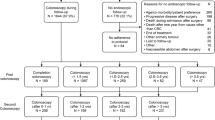Abstract
PURPOSE: Colonoscopy is the preferred method for colorectal cancer surveillance of high-risk patients. Despite its high sensitivity, polyps or cancers may be undetected by colonoscopy and later attributed to an accelerated adenoma-carcinoma sequence. This study assesses how the characteristics of colorectal cancers found at intervals between surveillance relate to the adenoma-carcinoma sequence and its prevention. METHODS: The records of 557 patients with colorectal cancer that were diagnosed from January 1, 1990, to December 31, 1996, were reviewed to identify those patients who had prior colonoscopic surveillance within 60 months of their diagnosis. RESULTS: There were 29 (5.2 percent) patients who had one or more colonoscopies before diagnosis of their colorectal cancer. Mean interval between diagnosis and prior colonoscopy was 23 (range, 4–59) months. The distribution of cancers included nine cecum, two ascending, three hepatic flexure, five transverse, one splenic flexure, three descending, two sigmoid, three rectum, and one anal canal. The mean tumor size was 4.4 cm for the cecum and 2.4 cm for all other locations. There were 7 Tis, 6 T1, 4 T2, and 12 T3 lesions. Six patients with T3 lesions had prior colonoscopies within 24 months of the diagnosis. Three of four patients with lymphatic metastases had tumors in the cecum. Twenty tumors (69 percent) were well or moderately differentiated. Mean follow-up was 41 (range, 7–95) months with two local recurrences and two unrelated deaths. CONCLUSIONS: Size, differentiation, and stage of colorectal cancer in addition to the interval to diagnosis suggest that the majority of cancers found during surveillance colonoscopy followed prior false-negative examinations. Because cecal landmarks are most constant, prior photographic documentation may help to prove or disprove fast growth of cancers found in the cecum during surveillance colonoscopy.
Similar content being viewed by others
References
Landis SH, Murray T, Bolden S, Wingo PA. Cancer statistics, 1998. CA Cancer J Clin 1998;48:6–29.
Toribara NW, Sleisenger MH. Screening for colorectal cancer. N Engl J Med 1995;332:861–6.
Winawer SJ, Fletcher RH, Miller L,et al. Colorectal cancer screening: clinical guidelines and rationale. Gastroenterology 1997;112:594–642.
Haseman JH, Lemmel GT, Rahmani EY, Rex DK. Failure of colonoscopy to detect colorectal cancer: evaluation of 47 cases in 20 hospitals. Gastrointest Endosc 1997;45:451–5.
Rex DK, Cutler CS, Lemmel GT,et al. Colonoscopic miss rates of adenomas determined by back-to-back colonoscopies. Gastroenterology 1997;112:24–8.
Hixson LJ, Fennerty MB, Sampliner RE, Garewal HS. Prospective blinded trial of the colonoscopic miss rate of large colorectal polyps. Gastrointest Endosc 1994;37:125–7.
Rex DK, Rahmani EY, Haseman JH, Lemmel GT, Kaster S, Buckley JS. Relative sensitivity of colonoscopy and barium enema for detection of colorectal cancer in clinical practice. Gastroenterology 1997;112:17–23.
Leggett BA, Cornwell M, Thomas LR,et al. Characteristics of metachronous colorectal carcinoma occurring despite colonoscopic surveillance. Dis Colon Rectum 1997;40:603–8.
Winawer SJ, Zauber A, Diaz B. The National Polyp Study: temporal sequence of evolving colorectal cancer from the normal colon [abstract]. Gastrointest Endosc 1987;33:167.
Corman ML. Colon and Rectal Surgery. 3rd edition. Philadelphia: JB Lippincott, 1993.
Author information
Authors and Affiliations
Additional information
Read at the meeting of The American Society of Colon and Rectal Surgeons, San Antonio, Texas, May 2 to 7, 1998.
About this article
Cite this article
Gorski, T.F., Rosen, L., Riether, R. et al. Colorectal cancer after surveillance colonoscopy. Dis Colon Rectum 42, 877–880 (1999). https://doi.org/10.1007/BF02237093
Issue Date:
DOI: https://doi.org/10.1007/BF02237093




